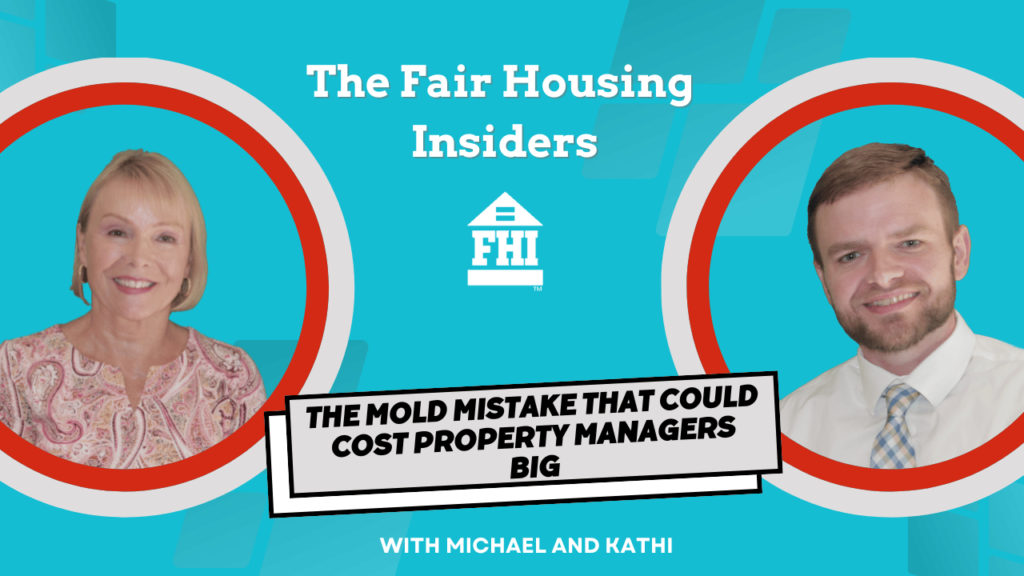For property managers, mold is more than just a maintenance issue—it can quickly evolve into a serious fair housing matter that could cost them big. Understanding how to recognize and respond to mold-related complaints is crucial to staying in compliance with the Fair Housing Act and protecting both your residents and your business.
In a recent discussion on Fair Housing Insiders, fair housing attorney Kathelene Williams and host Michael Coughlin unpacked how mold issues can intersect with fair housing compliance—and what property managers need to know to handle them correctly.

Table of Contents
When Does Mold Become a Fair Housing Issue?
Mold is present in every environment to some extent, but when a resident claims that mold is causing or worsening a health condition, the situation can shift from routine maintenance to a potential fair housing concern. According to Williams, “The moment a resident says the mold is making them sick—whether or not they use the term ‘disability’—you need to treat it as a possible request for a reasonable accommodation.”
This is key: Residents don’t need to use formal legal language for their complaints to be valid under fair housing laws. If a resident reports that mold is affecting their health, property managers must begin the reasonable accommodation process and verify whether the individual has a disability impacted by the presence of mold.
The Role of Third-Party Mold Experts
When mold concerns arise, and especially when health issues are mentioned, it’s not enough to rely solely on in-house maintenance evaluations. It is strongly recommended to bring in a qualified third-party mold expert.
There are private companies that specialize in mold analysis and can identify the types and levels of mold present and help determine whether those levels are potentially dangerous, especially to someone with a disability. These findings provide the objective documentation you need to assess the next steps and demonstrate due diligence.
Documentation: Your Best Defense
As with all fair housing matters, thorough documentation is critical. If a mold-related issue turns into a complaint, the strength of your documentation could be the deciding factor.
Here’s what your file should include:
- Initial Complaint: Record the resident’s report, including any claims that the mold is making them sick.
- Accommodation Process: Note all steps taken to verify the presence of a disability and the potential connection to the mold exposure.
- Professional Assessment: Include the report from your third-party mold expert, outlining types and levels of mold.
- Remediation Efforts: Document any mold removal or remediation work conducted based on the expert’s findings.
- Resident Communication: Keep a detailed record of all communication with the resident, especially explanations regarding the mold findings and steps taken to address their concerns.
Sometimes, you have to help residents understand that mold exists everywhere and that it’s the levels and types that determine the health risks. Clear and respectful communication goes a long way.
Don’t Stop at Maintenance
Too many property managers stop after a quick maintenance check shows no mold. But when a resident continues to complain about health issues, you must follow the full process.
Failing to address these concerns appropriately could not only escalate the situation but also lead to a fair housing complaint—adding legal and reputational risks to an already stressful maintenance problem.
Final Thoughts
Mold may be a four-letter word in the world of property management, but handling it doesn’t have to be a nightmare—if you follow the right steps. Recognize when a complaint shifts into fair housing territory, involve qualified professionals, and document every part of the process. Doing so protects both your residents and your property.
You may also like:
- Fair Housing Liability: When Does Resident-on-Resident Harassment Trigger Management’s Duty to Act?
- Retaliation vs. Rule Enforcement: Navigating the Fair Housing Fine Line
- Top 3 Fair Housing Risks for Property Managers in 2026
- A Year of Upheaval: How 2025 Impacted Fair Housing Operations
- When Should You Involve a Fair Housing Attorney?
Podcast: Play in new window | Download | Embed
Subscribe: Apple Podcasts | Android | Pandora | Blubrry | Youtube Music | RSS
